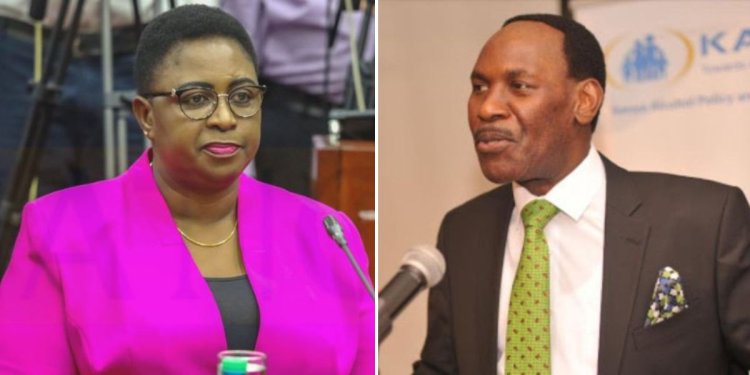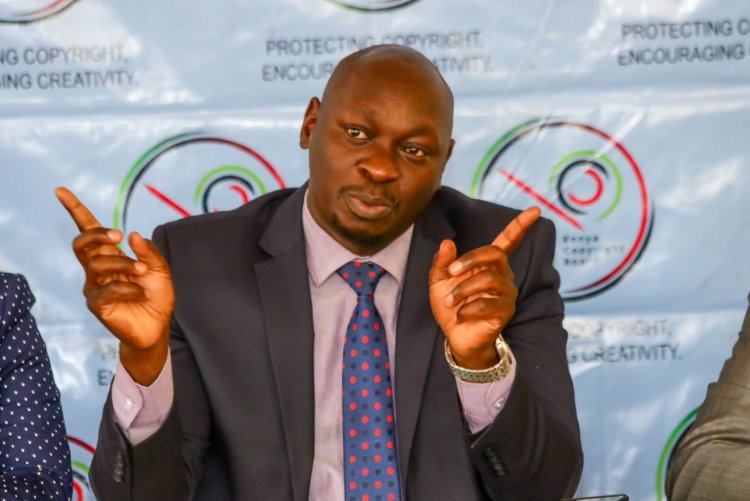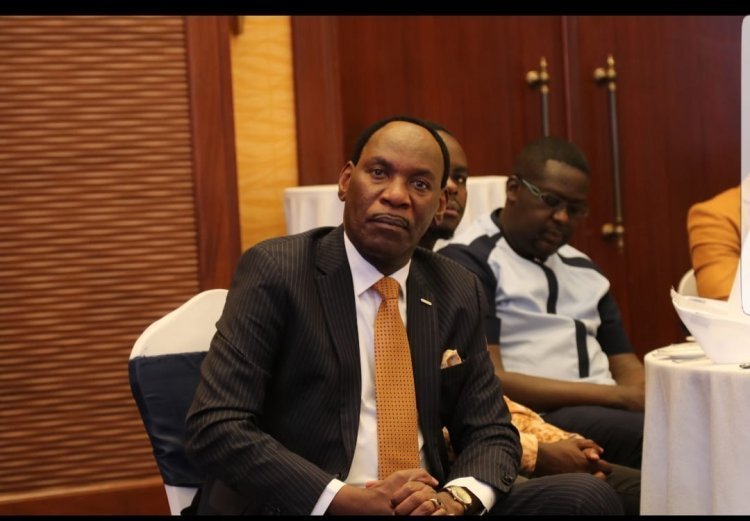Ezekiel Mutua Drags Aisha Jumwa In War Over Ksh173M Meant For Artists
Mutua dismissed the pointing of fingers by KECOBO by arguing that MCSK had followed the necessary procedures to ensure that the appropriate funds were being paid to the deserving artists.

Music Copyright Society of Kenya (MCSK) Chief Executive Officer (CEO), Ezekiel Mutua has escalated his row against the Kenya Copyright Board (KECOBO) for claims that the society shortchanged artists by roping in Gender Cabinet Secretary Aisha Jumwa.
KECOBO had on Wednesday, February 21 invited the Ethics and Anti-Corruption Commission (EACC) to open a probe into MCSK's activities as well as those of other Collective Management Organisations (CMOs) including the Kenya Association of Music Producers (KAMP) and Performers Rights Society of Kenya (PRISK), which are also composed of KECOBO
However, Mutua dismissed the pointing of fingers by KECOBO by arguing that MCSK had followed the necessary procedures to ensure that the appropriate funds were being paid to the deserving artists.
"We ran a public notice on January 19 citing the amount of money to be distributed and the criteria to be used for distribution. This was way before the ongoing distribution started. The distribution which started on 25th January runs all the way to March 29, 2024," he stated.

Kenya Copyright Board Chairperson Joshua Kutuny at a press address. /NATION MEDIA GROUP
"We cited the rules of distribution and criteria based on log sheets from licensed broadcasters and the amount of money declared for distribution. But today KECOBO says we should have paid using something they are calling the 70% rule. Where exactly in the Copyright Act or any other law in Kenya does it talk of the 70% rule?"
The following day, in his defence, Mutua argued that before commencing the 3-month distribution exercise, the period and criteria for distribution were well stipulated in the public notice that was published in the national dailies on Friday, January 19, 2024.
According to him, MCSK posted the same on all its social media platforms way before the distribution commenced and had been updating its members on the process.
The three-month distribution period, he added was meant to give MCSK members sufficient time to update their music catalogues and other personal data such as bank accounts, mobile money accounts and Kenya Revenue Authority (KRA) PIN. Mutua added that his plan to distribute Ksh20 million royalty to artists was ratified by Jumwa.
"Since the distribution started, we have received positive responses from our members who have been engaging us online and others on social media. Many artists have visited our offices to update their catalogues and are getting their dues in line with MCSK distribution rules," read the letter in part.
"It's imperative to note that the MCSK Royalties Distribution Notice published in the dailies on January 19 (way before the distribution began) was done after consultations with the CS in charge of Gender, the Arts, Culture and Heritage, Hon. Aisha Jumwa, the KECOBO and relevant stakeholders. The notice stated clearly that the monies available for distribution for Quarter One of 2024 was Twenty Million Kenya Shillings (Ksh20,000,000)."
Mutua also argued that the information on the amount allocated for distribution was shared with MCSK members through the public notice and other platforms way before the distribution commenced and there was no objection or query on the amount and the criteria to be used.
Unlike in the past when members got monies through mobile money platforms and were denied the opportunity to ask any questions, the former Kenya Film Classification Board (KFCB) CEO invited MCKS members to a physical event at a city hotel on January 25 and shared the information with them, adding that there was no query on the amount declared for distribution nor the criteria used.
"We are therefore disturbed to see documents circulating on social media questioning the amounts distributed and raising malicious and unfortunate allegations of misappropriation. How can anyone reach the conclusion of misappropriation in an ongoing process?
"Out of the three CMOS licensed by the Kenya Copyright Board for collection and distribution of royalties, only MCSK is distributing. Yet we use the same system imposed on us by the regulator and share the revenue proportionate to our membership. How come no one has an issue with the ones that have not been distributed? Is it a crime for MCSK to have taken the decision to distribute?" Mutua strongly posed.
KECOBO, in a five-page letter, had accused the three organisations, among them MCSK, of paying less than a third of all royalty collections (estimated at Ksh249 million) to artists and abusing the rest of the monies, prompting the board to call upon EACC to launch the probe.
"Where did the Kenya Copyright Board get the amounts they claim to base on what he calls the "70% rule?" Where is the 70% rule in the Copyright Act, in the regulation or Constitution?" Mutua indicated in his latest letter refuting claims that the amount was collected, showcasing instances of artists complaining of meagre pay in public to back his sentiments.
"This time round we have used both general and scientific distribution methods and increased the royalties to our members by a huge percentage, strictly relying on log sheets from our licensed broadcasters and the amount of money available for distribution. Where is the other money KECOBO claims should have been distributed? Why were these figures not used to question the amounts we declared in the public notice on distribution before we started the process?"
Mutua accused KECOBO of making remarks meant to incite unsuspecting members to think they have been cheated and revealed that the MCSK board engaged with its lawyers to address the matter, setting the precedence for a legal showdown.
The KECOBO board had indicated that the three organisations ought to have distributed Ksh173 million representing 70 per cent of the collected revenues, backing this up with data showing that the highest earner Rehema Lugose took home Ksh757,092, a figure lower than Ksh4,540,000 she was entitled to while the second, Reuben Kigame, received Ksh122,410 down from Ksh734,460.

MCSK CEO, Ezekiel Mutua during a gala dinner hosted by the Light Group of Schools to mark the acquisition of the Light Schools by the American Light Pulse Group on June 27, 2023. /EZEKIEL MUTUA
"Let me take this opportunity to assure our members that MCSK shall serve them in line with the mandate they have given the Board through the Articles and Memorandums of Association and that we shall not succumb to pressure from corrupt cartels who want to divert attention as they continue to exploit gullible artists," Mutua vowed.
"MCSK is on a rebound after years of being in the doldrums and the cartels are worried that the newly found vibrancy and optimism among artists is going to enlighten them about their rights to the detriment of those who have impoverished artists for years."






